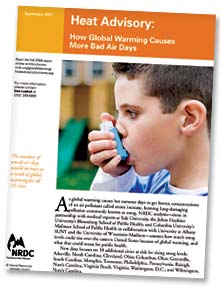Asheville is one of 10 cities in the eastern and southern U.S. that will experience fewer healthy air days as a result of global warming, according to a report released Sept. 13 by the Natural Resources Defense Council and Environment North Carolina. By 2050, Asheville will have more than twice as many bad-air days per year, the report predicts.

An updated version of a 2004 study highlighting the link between global warming and smog, the report also mentions Raleigh, Wilmington and Greenville, S.C., as cities in the region that will be affected by worsening smog.
Such days occur when ground-level ozone exceeds the health-based air-quality standard set by the Environmental Protection Agency. The pollutant is formed when compounds in tailpipe and power-plant emissions interact with other components in the atmosphere under hot, dry conditions. And as global warming ratchets up summer temperatures, concentrations of ground-level ozone—more commonly known as smog—are expected to increase.
Besides obscuring the view of a ridgeline on the horizon, smog can trigger asthma attacks, particularly in children and the elderly. In Atlanta, ozone has been linked to increased hospital admissions for asthma and lower-respiratory problems, the report notes.
“The chemical reactions that cause smog are very temperature-dependent,” explains Dr. Don Richardson of Brevard. “Global warming will exacerbate an already serious risk on bad-air days. It can hinder the normal lung development in children: We may not get as many Olympic runners out of our kids,” says Richardson, who serves on the board of the local chapter of Physicians for Social Responsibility. (The nonprofit group contributed to the report.) “And it can lead to increased heat deaths and rising heart and pulmonary deaths.”
Despite the grim news, however, “Asheville isn’t one of the worst cities,” notes Richardson. “Of course, the [air-quality] standard is a little bit of a compromise in and of itself. You’d rather have no pollution in the air. When I was a kid, it was a rare kid who had asthma,” notes Richardson, who is 77. “Now, it’s common.”
This past summer may have offered a taste of what’s to come. Last month was hottest August ever recorded in Asheville and the second-hottest month on record, according to Scott Stephens of the National Climatic Data Center.
“June and July were fairly average,” he notes. “August was what stood out. It was very unusual; the drought really exacerbated it.” Temperatures reached 90 degrees or higher on 15 days that month, he reports, adding, “The normal number of days with highs of 90 or higher are 3.3 downtown and 2.5 at the airport.” The warmest month on record since downtown temperatures began to be tracked in 1902 was July of 1984, says Stephens.
But so far, ozone levels haven’t kept pace with the extreme temperatures. “We are doing great for ozone this year,” says Air Quality Inspector Arnie Lingle of the WNC Regional Air Quality Agency. In August, he notes, ozone levels were considered below optimal on just three days, falling in the “yellow” category. “For now, at least in terms of Buncombe County, we’re not experiencing the ozone problems we had in the past five years. The main thing I can attribute the change to is the pollution-control devices they’ve installed at the Progress Energy plant in Skyland,” adds Lingle. In cities like Charlotte, with bigger populations and increasing traffic volume, rising temperatures and corresponding smog increases “seem to be the trend,” he notes.
But as Asheville keeps growing, the local situation could change drastically, the report suggests.


Before you comment
The comments section is here to provide a platform for civil dialogue on the issues we face together as a local community. Xpress is committed to offering this platform for all voices, but when the tone of the discussion gets nasty or strays off topic, we believe many people choose not to participate. Xpress editors are determined to moderate comments to ensure a constructive interchange is maintained. All comments judged not to be in keeping with the spirit of civil discourse will be removed and repeat violators will be banned. See here for our terms of service. Thank you for being part of this effort to promote respectful discussion.